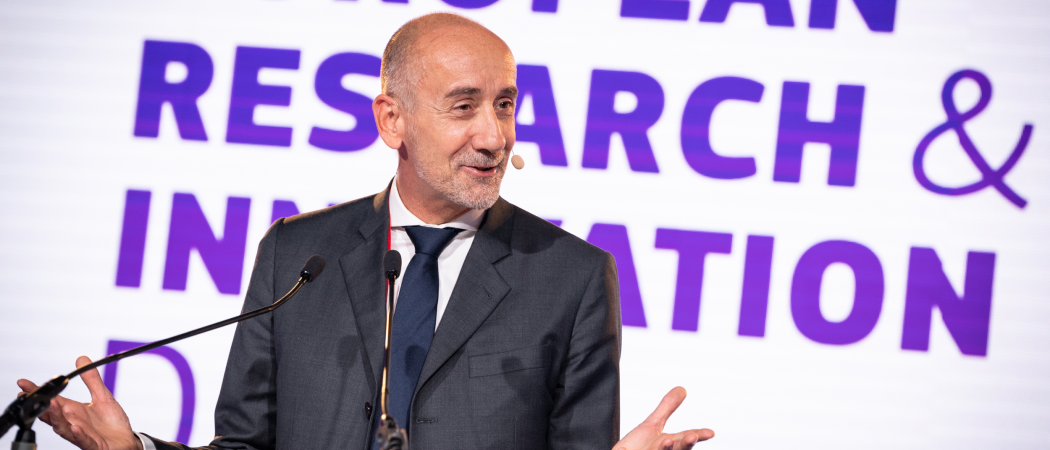Five grand challenge projects - in cancer, soil health, ocean pollution, climate neutral cities and adapting to climate change – are ready to roll, confirms EU research chief Jean-Eric Paquet

EU research chief, Jean-Eric Paquet. Photo: Twitter
The Horizon Europe research missions will get off the ground in the next few weeks, but even at this eleventh hour, EU research chief Jean-Eric Paquet is not in a position to announce exactly when.
None of the five missions is guaranteed an automatic go-ahead, and in a speech today Paquet prevaricated saying, “We might start with not all five, but seeing it today, it looks quite promising for all five missions.”
Since September, the European Commission has been sketching the outline of five proposed research missions that among other goals, will attempt to fight cancer, lead cities to climate neutrality and restore soil health.
With the plans at hand, the Commision is now ready to give the go ahead for the projects, each of which involves an integrated portfolio of research projects, policy measures and possibly even legislation, with the aim of reaching goals that could not be achieved through individual actions.
The lack of clarity around the launch of the missions, a new feature of EU research – is part of the overall picture of delays to Horizon Europe, with the Commission still to publish the work programmes detailing all the calls for the next two years.
Over the last few months, the Commission and member states have been arguing over third country access to quantum and space projects, holding up the release of the work programmes, which were first expected in late March, then April, then May.
Last week, policy makers reportedly reached an agreement on the UK, Switzerland and Israel taking part in quantum and space research.
Now the show can go on, with the bulk of the work programmes to be released by mid-June, Paquet confirmed.
Following this the next item on the agenda at DG Research is the pact for research and innovation, which will set out the values, principles and funding ambitions that underpin European research.
The Pact, to be signed by member states in a show of commitment, is “in its very final stage” of preparation, Paquet told a meeting organised by the Stockholm Trio, a body representing the city’s three universities.
Three, or four, or five?
The research missions set out the Horizon’s most ambitious goals, but the Commission has thus far revealed few details about how the missions will be run.
They are intended to mobilise forces from across Europe, involving citizens and national governments and, as former EU research commissioner Carlos Moedas said, make people on the streets talk about science. The shape of the missions programme owes much to Mariana Mazzucato, economics professor at University College London, former special adviser to Moedas, whose idea is that the mission economy will see a bigger public sector role in tackling societal challenges.
Four of the proposed missions have concrete goals. One will seek to prevent three million cancer deaths in Europe, while another will aim to restore up to 75% of European soils. A third will support 100 cities in moves to become climate neutral, while the fourth mission will help 200 regions become more climate resilient. All this should be done by 2030 – a tight deadline by all accounts.
The fifth mission, on oceans, still has no defined goal. “Measures to deal with ocean pollution, particularly, are very cross-cutting and numerous, so no specific objective [has been] set for the ocean mission yet,” said Paquet. Whether this means the mission will take longer to get off the ground than the others, is unclear.
The missions are much bigger than the €95.5 billion Horizon Europe budget can deliver on, which means they need national resources, possibly from outside the EU – a detail that is regularly underlined by the Commission.
Evidently, research alone cannot prevent three million cancer deaths. But it can kick-start the effort. From there, it is up to industry, member states and citizens to take up and apply research findings.
Once adopted, the Commission will detail how the missions are supposed to reach their goals, with calls for projects due to be outlined in the updated work programmes later this year.
Research pact
After a stuttering start, it now looks as if Horizon Europe will be properly underway this summer. The next step is the signing of the research pact, to bring member states on board the EU research agenda for the next decade.
The Commission is continuing discussions with various research organisations and university associations on the details of the Pact. This will culminate in an open meeting between the EU research commissioner Mariya Gabriel and stakeholders at the Commission’s R&I event.
Paquet did not disclose any details, but said the Pact will outline values and principles on which the future European research ecosystem will be built, hinting that cooperation on green hydrogen is an area he ‘expects’ to see in the first version of the Pact.
The goal is to set a common ground for European research, building cooperation beyond Horizon Europe and providing a framework for member states to organise transnational research projects that do not involve the Commission.
As Paquet sees it, the European Research Council cannot make up for national shortcomings in the funding for fundamental research. Member states have to work together to build up capacity and invest in research, doing joint programming to create economies of scale and avoid duplication. The Pact is intended as a sign of commitment to these principles.





 A unique international forum for public research organisations and companies to connect their external engagement with strategic interests around their R&D system.
A unique international forum for public research organisations and companies to connect their external engagement with strategic interests around their R&D system.